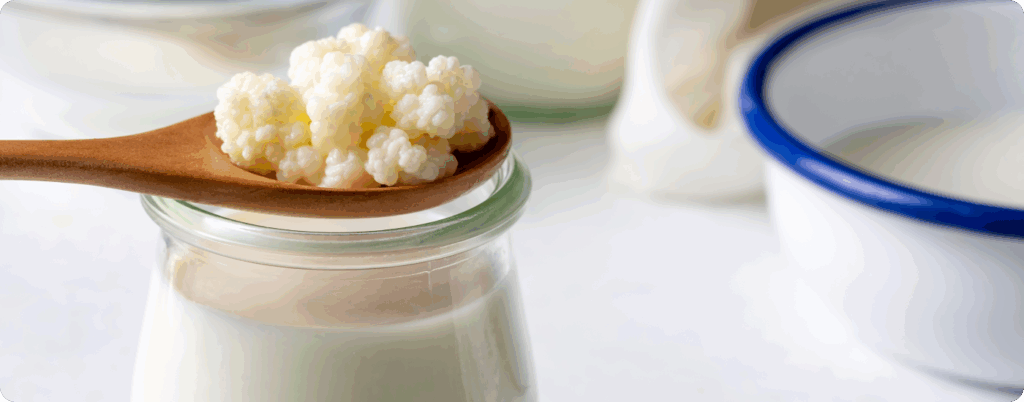PLEASE NOTE: The information in this blog is for educational purposes only. It is not a substitute for professional medical advice. Consult your healthcare provider if you’re seeking medical advice, diagnosis, or treatment.
What comes to mind when you think of generational wealth? (stay with me, this is going somewhere.) You may think of bars of gold, fancy jewelry, or sprawling countryside estates. But in certain parts of the world, like the Caucasus Mountains, generational wealth had a very different meaning.
For centuries, tribes in these mountains passed kefir grains from generation to generation as a source of wealth & sustenance. Why on earth were these grains so treasured? Let’s find out.
In this article, we explore the profound connection between kefir and gut health, how to make your own kefir, and discover numerous other kefir benefits.
What is Kefir?
Kefir is a tart, fermented dairy product enjoyed around the world in countries like the United States, Brazil, Japan, and France (1). Originating in the Caucasus Mountains, kefir has been enjoyed for centuries as a way to improve the shelf life and nutritional value of surplus milk.

Not only is kefir a source of natural probiotics, but it’s also considered a functional food. Probiotics are living microorganisms that can lead to health benefits like improved skin health, gut health, and numerous others (2, 3). Functional foods like kefir contain ingredients that can act specifically to reduce the risk of certain diseases (4, 5).
Kefir fermentation can also reduce the lactose content by up to 30%, making it a more approachable option for those who may not tolerate dairy (6). As you’ll see below, kefir is also an amazing source of vitamins, minerals, and other powerful nutrients.
Kefir and Gut Health: What’s the Connection?
One of the most notable benefits of kefir is its impact on gut health, and it’s been recommended historically for a variety of GI disorders (7, 8).

Fermented foods like kefir are able to alter the intestinal microbiota, which is a massive collection of microorganisms found in the intestinal tract (9). These microbiota then impact your brain health, immune system, cardiovascular health, and other critical aspects of health (10).
With over 50 species of yeast and bacteria, kefir may even help relieve constipation and reduce gut dysbiosis (11, 12). Regular kefir consumption is also connected to improved digestion (13).
Although kefir and gut health get most of the attention, kefir benefits don’t stop at the gut.
10 Amazing Kefir Health Benefits
The connection between kefir and gut health is just the beginning of a long list of potential benefits from this ancient superfood. Here are 10 other kefir benefits.
1. Vitamin Content
Like so many animal foods, kefir is loaded with vitamins. In particular, kefir offers a generous amount of essential vitamins such as (14):
- Vitamin A
- Vitamin B1, B2, B5, B9
- Vitamin C
- Vitamin K
Kefir also provides healthy protein, fat, and carbohydrates.
2. Mineral Density

Kefir is also a great source of minerals like magnesium, calcium, sodium, and potassium needed for energy production and cell growth (15, 16).
3. Added Nutritional Value
If these vitamins and minerals aren’t enough, the fermentation process can actually enhance the content of key nutrients found in kefir, especially B vitamins (17). Proteins found in kefir can also become more digestible thanks to fermentation (18).
4. Lactose Intolerance Improvement
One of the most commonly claimed benefits of kefir is the potential for improving lactose intolerance. Lactose is a type of sugar found in dairy products that many people have difficulty digesting, leading to gas, diarrhea, or other unpleasant symptoms.

Modern science has begun to verify these claims as numerous studies have found improvements in lactose intolerance from kefir consumption (19, 20, 21, 22).
5. Amino Acid Content
Kefir is also rich in amino acids (the building blocks of proteins) such as methionine, tryptophan, threonine, and numerous others (23). These amino acids can help regulate body weight, nervous system function, and immune function.
6. Bone Health

Like other dairy products, kefir is a source of calcium and other components that may promote bone health and help prevent bone loss (24, 25). Kefir is even being explored as a way to help manage osteoporosis, which impacts millions worldwide.
7. Skin Health
Kefir has even been shown to improve skin health by preventing pathogen invasion, modifying microbiota, and helping repair barrier function (26).
8. Improved Athletic Performance
Athletes can also benefit from drinking kefir. A study on female professional soccer players showed that those who regularly drank kefir had better performance indicators (27).

Another study using a probiotic supplement derived from kefir found that users experienced accelerated recovery and improved endurance (28).
9. Immune Health
Given the strong connection between kefir and gut health, it can also boost immunity thanks to its numerous beneficial components (29, 30).
10. Metabolic Health Improvements
Metabolic health can be characterized by waist circumference, blood pressure, cholesterol, and other indicators. Kefir has been noted to contribute to a wide variety of improvements, such as:
- Kefir may help reduce obesity (31).
- Decreases in fasting insulin, insulin resistance, and both systolic and diastolic blood pressure (32, 33).
- Kefir has anti-diabetic properties and has shown promise against diabetes mellitus (34).
- The polyphenols and probiotics in kefir may help prevent hypertension (35).
How to Make Kefir & Where to Find It
Making kefir at home is surprisingly simple and allows you to control the quality and potency of your creation. Here are 5 simple steps for making kefir:
Step 1: Prepare Your Grains
- If using dehydrated grains, reactivate by soaking in fresh milk for 24-48 hours
- Rinse fresh grains gently with cool, non-chlorinated water if needed
Step 2: Combine Grains & Milk
- Use a ratio of 1-2 tablespoons of kefir grains per 2 cups of milk
- Place grains in a clean glass jar
- Pour milk over grains, leaving 1-2 inches of headspace
Step 3: Cover & Ferment
- Cover the jar with a breathable cloth or a coffee filter
- Secure with a rubber band
- Leave at room temperature (68-75°F) for 12-24 hours
Step 4: Monitor
- 12 hours: Mild, thin kefir with subtle tang
- 18-24 hours: Traditional kefir consistency with pronounced tang
- 24+ hours: Very thick, extremely tangy kefir (may separate)
Step 5: Strain & Store

- Pour kefir through a non-metal strainer
- Gently stir grains with a non-metal spoon if needed
- Collect finished kefir in a clean container
- Transfer grains to fresh milk for the next batch
You can find kefir grains from sources like Amazon, Cultures for Health, or other online retailers. Many local health food stores carry kefir grains as well.
Kefir can be made with a variety of milk options like cow, goat, sheep, camel, or buffalo (36). Try to avoid ultra-pasteurized, low-fat, or lactose-free milks as these may not ferment properly. Given the minimal amount of processing, many choose to use raw milk when making kefir.
If you don’t want to make your own kefir, it can often be found at your local farmers market or from popular grocery stores like Sprouts or Whole Foods.
The Hype Around Kefir is Real
Kefir is not just a trendy superfood but a scientifically backed strategy for improving gut, immune, skin, bone health, and much more. It’s loaded with vitamins, minerals, amino acids, probiotics, and other components that can improve your health.
Subscribe to future articles like this: